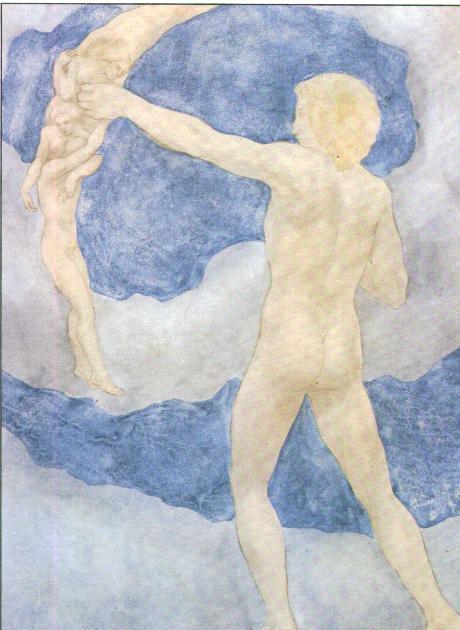Khalil Gibran
 My friend handed me a book a couple months ago, by a Lebanese author I didn't know. It stood near my bed untouched, until yesterday I finally picked it up and was really taken by it.
My friend handed me a book a couple months ago, by a Lebanese author I didn't know. It stood near my bed untouched, until yesterday I finally picked it up and was really taken by it.
The Prophet, by Khalil Gibran, is on the surface a religious text. A ship has arrived and the main character, who has long awaited the ship, will be leaving. Upon his departure, many towns people ask him about numerous topics, and the main section of the poem is the main character's pronouncements on everything from food to love, clothes and death. Some of them are appealing, other less so.
Normally I wouldn't be partial to reading anything with such a description, it rings of self-help book, or 'Don't sweat the small stuff'. But something captured my attention and emotion. Perhaps its modernity, the power of the poetry, its secular humanism (for although God is mentioned, this is not an Epistle written hundreds of years ago, with religious followers, a liturgy). Perhaps what grabbed me was that in very begging the 'prophet' deals with the conflict of leaving, which is very much my present state.
How shall I go in peace and without sorrow? Nay, not without a wound in the spirit shall I leave this city. Long were the days of pain I have spent within its walls, and long were the nights of aloneness; and who can depart from his pain and his aloneness without regret? Too many fragments of the spirit have I scatterd in these streets, and too many are the children of my longing that walk naked among these hills, and I cannot withdraw from them without a bruden and an ache. It is not a garment I cast off this day, but a skin that I tear with my own hands. Nor is it a thought I leave behind me, but a heart made sweet with hunger and with thirst. Yet I cannot tarry longer.
Gibran has an interesting biography. Born in Lebanon in 1883, his father was imprisoned for tax evasion and his family immigrated to Boston, where they lived in poverty. There his talent was recognized and Fred Holland Day tutored him. At 15, he returned to Lebanon to finish his education and learn Arabic. Gibran rebeled against the parochial education of the Maronite-founded school which offered a nationalistic curriculum. After completing his studies, he returned to Boston, but he and his family was burdened with poverty and death. He wrote intially in Arabic, publishing in English only as late as 1915. Before this, he travelled to Paris and then settled in New York, gathering influences and contacts whereever he went. He became politically active, viewing WWI as an Lebanon's opportunity of liberation from the oppressive Ottoman Empire. Aas a result of his liberal positions towards religion and women, his desire to bring western ideas to Arabic countries, he never became established as an Arabic writer. He died on April 10th 1931, of liver cancer. The New York streets staged a two-day vigil for Gibran’s honor, whose death was mourned in the U.S. and Lebanon. His will left large amounts of money to his country, since he wanted his Syrian citizens to remain in their country and develop it rather than immigrate.

0 Comments:
Post a Comment
<< Home